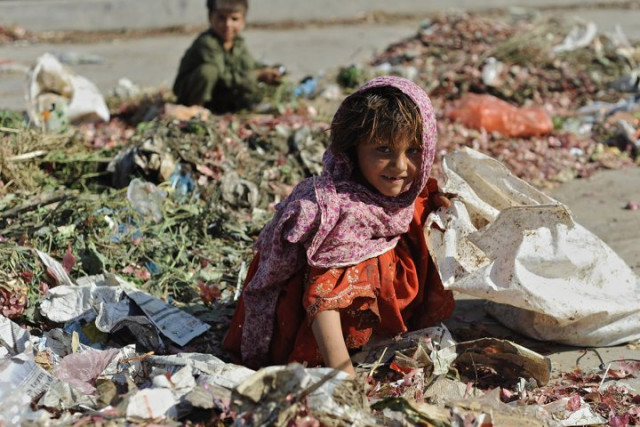Pakistan's poor record keeps it on human trafficking watchlist for second year: US report
Bonded labour in Sindh and Punjab remains Pakistan's worst human trafficking problem

PHOTO: AFP
Countries whose governments do not fully comply with the Trafficking Victims Protection Act’s (TVPA) minimum standards are placed on Tier 2. Of these, countries where the numbers of victims are very significant or significantly increasing, and that have failed to make an effort to combat trafficking are brought down a notch and placed on Tier 2 Watch List, according to the 382-page report.
Pakistan shares the tier with countries like Djibouti, Cuba, Burma, Sri Lanka, Malaysia, Tunisia and Saudi Arabia, while Afghanistan, Iraq, India, Indonesia, the UAE and Oman, among others, are placed in Tier 2. Malaysia, which had plummeted last year to the lowest category, Tier 3, was raised a notch this year to the "Watch List" category of Tier 2, after it exhibited "significant efforts" in fighting human trafficking.
Countries in Tier 3 are those whose governments do not respect international norms or laws on trafficking and "are not making significant efforts to do so." While Russia has remained in Tier 3 since 2013, China rose a notch in 2014 to the Tier 2 Watch List, where it remained this year.
Human trafficking as an industry is worth $150 billion annually, the International Labour Organization says, of which one-third is the estimated contribution of the sex industry. "Trafficking in persons is an insult to human dignity and an assault on freedom," Kerry declared in the introduction to Monday's report as he called for a comprehensive "fight against modern slavery."
Bonded labour
Pakistan’s largest human trafficking problem is bonded labour, the report found, which was concentrated in Sindh and Punjab, and occurred mostly in agriculture and brick-making, but also, to a lesser extent, in fisheries, mining, and carpet-making industries. The report reinforces the notion that brick kiln owners and feudal landlords at times were affiliated with political parties or hold government positions, and used their influence to protect their involvement in bonded labour.
The report also highlighted that Pakistan was a destination country for men, women, and children (particularly from Afghanistan, Bangladesh and Sri Lanka) who were subjected to forced labour, while Women and girls from Afghanistan, China, Russia, Nepal, Iran, Bangladesh, Uzbekistan and Azerbaijan were reportedly subjected to sex trafficking in the country. The majority of Afghan victims in Pakistan were women and girls subjected to trafficking for the purpose of commercial sexual exploitation, including some through forced marriages.
The report recommends Pakistan, which was a source, transit, and destination country for individuals subjected to sex trafficking and forced labour, to “vigorously investigate and prosecute, respecting due process, suspected trafficking offenders and officials complicit in trafficking”; to pass anti-trafficking laws; ensure victims are not penalized for acts committed as a result of being subjected to trafficking;
The report highlights the lack of understanding of law enforcement officials who conflate human trafficking and migrant smuggling figures and report conflated numbers, as it recommends that the government improve efforts to collect, analyse, and accurately report data, distinct from the data on smuggling.
The report does mention the FIA’s efforts in countering the evil of trafficking. In May 2014, the agency had set up a research and analysis centre in Islamabad with four staff members dedicated to gathering and analysing data and trends related to human trafficking and smuggling. The same year the agency partnered with an international organization to set up a helpline and an email address for trafficking victims.
“It’s a fight we absolutely have to win,” Kerry asserted in his introduction. “It is a modern day human rights challenge of enormous proportions.”



















COMMENTS
Comments are moderated and generally will be posted if they are on-topic and not abusive.
For more information, please see our Comments FAQ